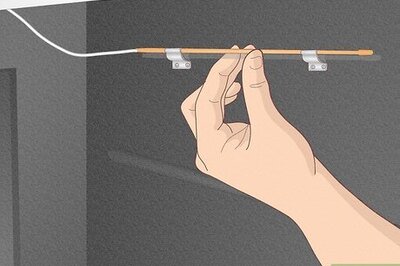
views
New Delhi/Washington: With the landmark India-US nuclear deal languishing even three years after it was signed, US Deputy Secretary of State William Burns will hold talks with senior Indian officials on Monday in yet another diplomatic bid to iron out differences over the civil nuclear liability regime.
Burns, who holds most powerful position in the US State Department after Secretary of State Hillary Clinton, touches down in New Delhi Sunday as part of the three-nation tour that includes Vietnam and Malaysia besides India.
Announcing the visit in Washington, the State Department said Burns will meet senior Indian officials "to discuss a broad range of bilateral, regional, and global issues, underscoring the continued growth in the strategic partnership".
Burns will also visit Mumbai to meet business leaders and formally open the American consulate general's new facility in suburban Bandra-Kurla Complex.
In New Delhi, Burns is expected to hold talks with Foreign Secretary Ranjan Mathai, who will be accompanied by Jawed Ashraf, joint secretary in charge of Americas, and other senior Indian officials. Burns is also expected to call on External Affairs Minister SM Krishna and meet National Security Adviser Shivshankar Menon.
The talks are expected to focus on resolving issues related to India's nuclear liability regime that is seen by American nuclear companies as onerous and a deterrent to starting nuclear business with New Delhi. The US has been pressing India to bring its liability law in conformity with international conventions.
The guidelines relating to the nuclear liability law were notified by the government last month. The issue figured prominently in discussions between Prime Minister Manmohan Singh and US President Barack Obama when they met on the sidelines of the ASEAN summit in Bali, Indonesia, last month.
During the talks, Manmohan Singh made it clear that India will work within the "four corners" of its domestic laws, indicating that it will not give in to any pressure from outside.
"I explained to him that we have a law in place and rules have been formulated... These will lie in parliament for 30 days. Therefore, we have gone some way to respond to concerns of American companies and within the four corners of the law of the land, we are willing to address any specific grievances," Manmohan Singh said after the talks with Obama.
Manmohan Singh also assured Obama that India will also ratify the Supplementary Convention (for nuclear damage).
The rules relating to the Civil Liability for Nuclear Damage Act effectively cap the amount and limit the duration (five years from the date of the accident) for which claims can be made against a supplier of nuclear power plant equipment. It could allay the concerns of companies such as GE Hitachi Nuclear Energy and Westinghouse Electric Co wishing to enter the lucrative Indian market.
However, differences persist, and it will be the effort of both sides to find some "common ground" on an issue that is holding up the operationalisation of the nuclear deal between the two countries, according to reliable sources.
The US has so far withheld any public comment on the implementation rules relating to the civil nuclear liability law as it wants to avoid a rhetoric in public.




















Comments
0 comment